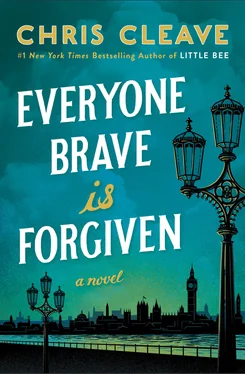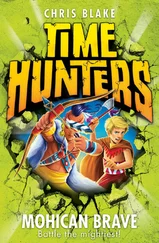“Be a dear and do my lipstick next,” said Mary, her teeth chattering.
Hilda said, “You’re doing very well.”
The water was rising in the basement — now Mary understood this — at about an inch a minute. While she had been kneeling the water, which had been up to her sternum, had risen to the base of her throat. It poured down from the ceiling, faster now that the rubble above was saturated. Some of the rescuers left and Mary stared after them, wild-eyed, until someone told her they had gone to rig pumps.
“What can we do?” Mary said.
Hilda looked at her strangely. “This.”
Now Mary began to struggle. She heaved against the beam as hard as she could, not minding the pain as the metal cut into her calves. She thrashed and bucked, and when the rescuers held her arms to keep her still, she began to fight against them. Water gushed from the ceiling in torrents.
When the level reached her mouth, Mary tilted her head back to keep her face clear of it. The water rose to her earlobes.
Hilda squeezed her hands until she was calm again. In the wavering light of the torches, Mary saw the look in Hilda’s eyes. Now she understood that the most awful thing was going to happen to her. Grief came. Its level rose. The water was over her eardrums now, muting the splashing of the rescuers as they made their last, frantic attempts.
Mary felt unbearable misery that Kenneth Cox was gone. His voice was still alive — this was the terrible thing. The boy never would be told to hush and now he yelled away, somewhere in the impossible music that was flooding her. Grief poured down from fire hoses.
“It’s all just a dream,” said Hilda. “Shh, just a dream.”
“SHHUSSSSSHH!” shouted Kenneth. “It! Is! Just! A! Dream!”
It was agony that he was gone, agony that pretty Beryl Waldorf had died mute and unconsoled, agony that Betty Oates still smiled, even now, when Mary shut her eyes. She arched her body back and forth. She wrenched against the beam that pinned her, and it was more than she could bear, it was really far too much, and it was so clear now that one had not believed in death at all — neither how quickly it came up one on, nor how fathomless its sadness was — until this moment when it was suddenly here.
She groaned in the darkness, and then she felt the sharp scratch as Hilda punctured her arm, through the fabric of her jacket and blouse, with the needle of a morphine syrette. Hilda was looking down at her calmly. “Shhh now. Just… a… dream.”
After a minute Mary’s breathing came under control and the chill of the black water was gone. A glow spread through her belly and up her spine. It was unfamiliar and yet perfectly native and good. She felt Hilda’s hands on her face, holding her up. “There now.”
Mary was still aware of what was about to happen to her, but only in the same way that one was aware of the crossword. It was something difficult that one might pick up, or might not. The relief of the morphine was upon her and she understood that the drug was a simple and merciful thing, no less appropriate than a bandage for a cut.
“Better?” said Hilda.
Mary supposed there was an answer. The water was almost up to her lips. How pretty Hilda was, how luminous and constant in the fickle light of the torches. Mary watched her friend, this debutante who had learned the habit of going out among bombs with no more protection than a tin hat and an armband to bring home the bodies of strangers.
It seemed to Mary that Hilda had asked a perfectly simple question. Certainly she should respond. The water, when the first trickle entered her mouth, tasted rather strange. How cold it was, and how sharp with soot and brick dust and yellow clay. How odd that London wanted to trickle into her. She smiled, but the water poured in and she supposed that she ought to close her mouth and breathe through her nose while she could.
How lovely was each breath. How peculiar that one had never noticed.
She felt certain that Hilda had asked her a question.
Morphine was the discovery — and it seemed obvious now — that every breath was perfect. The knowledge had been there all along, unnoticed and perfectly straightforward. How strange that one had never seen it. Was it an incapacity, a specific blindness of the mind? Or was it a mannered oversight? It would hardly be polite to go around noticing that every breath was lovely. She giggled, and water flooded in until she closed her mouth again.
The agony of her children’s deaths still sounded in an undiminished cacophony — yes, she was perfectly aware of it — but the anguish was no longer particular to her. It simply was: one could hear it clearly, and listen to it calmly, picking out its individual timbres and notes, distinguishing its great themes and minor phrases. She grieved for every quiet sigh Beryl Waldorf had made. Her heart broke for each timid inflection in Thomas Essom’s voice. She heard every harmonic in the screech of the chalk on the blackboard when she had written Tom’s surname after her own. Of course: nobody ever really died. Life lingered. Every breath would persist forever, written in the clay of the city. And given that this was so perfectly obvious, it suddenly seemed imponderable that the enemy would make the effort to pack high explosive into a metal casing, fight it through the defending fire, and drop it from twenty thousand feet over a city of immortals.
Hilda was watching with her eyebrows raised in a question, and Mary realized that this had been the case for some time, and possibly forever. “Better?” said Hilda again, or perhaps it was still the first time she had asked: the word dissolved into the groundwater of the city, the word without end.
She strained to place her mouth into air. “Yes, thank you. Much.”
Hilda seemed ready to cry.
Mary said, “I am sorry I wasn’t kinder to you.”
“Oh, don’t be sorry, it’s…” Hilda looked up at blackness. “It’s…”
Mary watched the incomplete phrase float up into the night and come to rest there, glittering in bright points at the farthest extremity of the sky. This was how the stars had been made, after all: each the end of an unfinished thought, each an answer that one had known all along. She realized, of course, that this was not the sky and the stars — only the torches of the rescuers and the black roof of the basement — but she also understood that it was the same thing.
And now she realized — as the black water rose above her nose and eyes, as the light of the stars became blurred through the water — that this breath inside her was her last. She smiled, exhaled, and sank.
Hilda squeezed her hands. The two of them had always known each other, of course. They were one person — she, and Hilda, and Alistair, and Tom. They had gone too far into the unendurable dark and now they glittered there, too far apart to be a comfort to one another anymore, but not so scattered that a godlike eye could never make of them a constellation.
The night lasted a moment, then forever.
In the dark, silhouetted against the stars of the rescuers’ torches, she watched Hilda’s face come down through the water toward her. Hilda’s black hair floated in strands against the light. Now she will have to have her hair reset, thought Mary. Why is she sinking down with me?
And then Hilda’s lips pressed against hers, and Hilda’s fingers pinched her nostrils closed, and Mary felt Hilda’s breath, sharp with tobacco and unutterably perfect, flooding into her. The breath hung suspended inside her, glowing and lovely. Mary held the breath until the life was gone from it, then sent it up to the surface. Against the torchlight she watched the silver bubbles rise. After a moment, Hilda’s mouth came down and breathed into her again.
Читать дальше












